UK Bail Laws: Understanding the Criteria and Decision-Making Process
When it comes to criminal law in the UK, one important aspect to understand is the bail process. Bail is the temporary release of an accused person, providing them the opportunity to await trial while staying outside of custody. However, the decision to grant or deny bail is not taken lightly and involves a thorough assessment based on several criteria.
Before we delve into the details of the decision-making process, it’s crucial to familiarize ourselves with the key factors that courts consider when determining bail:
- Flight Risk: One of the primary concerns for the court is whether the accused is likely to flee the country or fail to appear for their trial. This is evaluated based on factors such as previous criminal history, possession of assets abroad, strong ties to the community, and the severity of the charges.
- Public Safety: The safety of the public is of paramount importance. If there is a significant risk that the accused may pose a threat to others if released, the court may be inclined to deny bail. This assessment takes into account the nature of the offense, previous convictions or violent behavior, and any ongoing investigations.
- Severity of the Crime: The seriousness of the charges leveled against the accused is another critical factor considered during the bail decision. If the alleged crime is particularly heinous or carries a severe penalty, the court may lean towards refusing bail.
- Ties to the Community: The court will evaluate the accused’s connections to the local community, including family, employment, and social relationships. Strong ties can act as a deterrent against potential flight and improve the chances of being granted bail.
- Previous Criminal Record: Past criminal convictions can heavily influence the bail decision. Repeat offenders or individuals with a history of failing to appear in court are more likely to be denied bail.
At SQE Criminal Law & Practice Law UK, our team of solicitors is well-versed in navigating the complexities of bail applications. With extensive legal experience and an in-depth understanding of the criteria and decision-making process, we are dedicated to ensuring the best possible outcome for our clients.
If you require assistance with a bail application or have questions regarding the UK bail laws, our expert solicitors are here to help. We offer comprehensive SQE 1 and SQE 2 Preparation Courses to equip aspiring solicitors with the knowledge and skills required to excel in their legal careers.
For SQE 1 Practice Exam Questions, click here.
To access SQE 1 Practice Mocks FLK1 FLK2, click here.
To learn more about our SQE 2 Preparation Courses, please visit this page.
If you want to explore our comprehensive SQE 1 Preparation Courses, click here.
To stay updated with the latest SRA SQE Exam Dates, visit this link.
Feel free to contact us for legal advice or any further information you may require regarding UK bail laws and the SQE exams. We are committed to providing top-notch legal services and helping you achieve success in your legal career.
